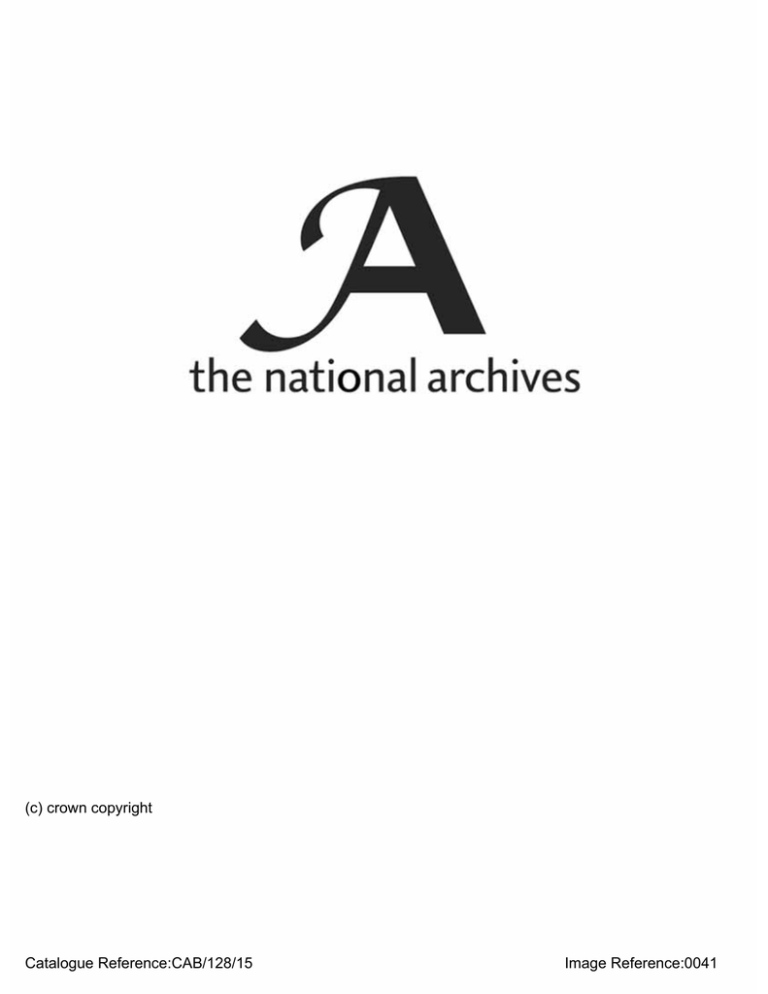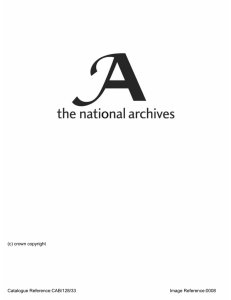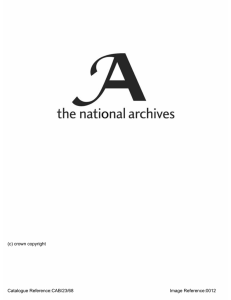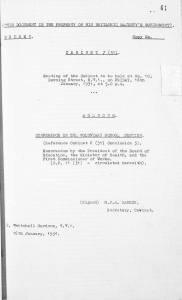(c) crown copyright Catalogue Reference:CAB/128/15 Image Reference:0041
advertisement

(c) crown copyright Catalogue Reference:CAB/128/15 Image Reference:0041 THIS DOCUMENT IS THE PROPERTY OF HIS BRITANNIC Printed for the Cabinet. MAJESTY'S GOVERNMENT June 1 9 4 9 SECRET Copy No. C M . (49) 41st Conclusion! CABINET 41 (49) CONCLUSIONS of a Meeting of the Cabinet held at 10 Downing Street, S.W. ]. on Monday, 20th June, 1949, at 11-30 a.m. Present: The Right Hon. C. R. ATTLEE, M.P., P-rime Minister (in the Chair) The Right Hon. HERBERT MORRISON, The Right Hon. Sir STAFFORD CRIPPS, M.P., Lord President of the Council. K.C., M.P., Chancellor of the Exchequer. The Right Hon. A. V . ALEXANDER, The Right Hon. HUGH DALTON, M.P., Chancellor of the Duchy of Lancaster. M.P., Minister of Defence. The Right Hon. VISCOUNT JOWITT, The Right Hon. VISCOUNT ADDISON, Lord Chancellor. Lord Privy Seal. The Right Hon. J . CHUTER EDE, M.P., The Right Hon. A . CREECH JONES, M.P., Secretary of State for the Secretary of State for the Home Colonies. Department. The Right Hon. A . WOODBURN, M.P., The Right Hon. P . J . NOEL-BAKER, Secretary of State for Scotland. M.P., Secretary of State for Commonwealth Relations. The Right Hon. ANEURIN BEVAN, M.P., The Right Hon. G . A. ISAACS, M.P., Minister of Health. Minister of Labour and National Service. The Right Hon. GEORGE TOMLINSON, The Right Hon. T. WILLIAMS, M.P., M.P., Minister of Education. Minister of Agriculture and Fisheries. H. WILSON, M.P., The Right Hon. J . Board of Trade. President of the The following were also present: The Right Hon. G . R. STRAUSS, M.P., The Right Hon. WILLIAM WHITELEY, M.P., Parliamentary Secretary, Minister of Supply (Items 1 and 2). I and 2). Treasury (Items Mr. C. P . MAYHEW, M.P., Parlia­ mentary Under-Secretary of State for Sir EDWARD BRIDGES, Treasury (Items 4 and 5). Foreign Affairs (Items 3-5). Secretariat : Sir NORMAN BROOK. Mr. A. JOHNSTON. Mr. S. E. V . LUKE. 4 C A B I N E T 41 (49) CONTENTS Minute No. 1 Subject Industrial Disputes Page .... .... 71 Dockers' Strikes. Railway Disputes. 2 Iron and Steel Bill 71 3 4 5 Import Policy Political Activities of Civil Servants W e s t e r n Union .... .... .... 72 73 74 .... .... .... Industrial Disputes. (Previous Reference: C M . (49) 40th Conclusions. Minute 4.) Dockers' Strikes. Railway Disputes. 1. The Minister of Labour said that members of the SteveUnion, had declined to unload two Canadian ships in London Docks and, as a result, 300 men had been suspended from employ ­ ment in the port. The Secretary of the Union, who was reported to have favoured the course taken by these men, was being seen at the Ministry of Labour that day. If the stevedores could not be persuaded to work these ships, other steps would have to be taken to get them unloaded. The situation in other ports was now satisfactory. The difficulties on the railways had now been narrowed down to the wages claim, and on this representatives of the two sides were meeting in conference that afternoon. The C a b i n e t Took note of these statements. Iron and Steel 2. The Cabinet considered a memorandum by the Minister of Bill. Supply ( C P . (49) 132) on the attitude which the Government should (Previous Reference: C.M.(49)40th Conclusions, Minute 1.) adopt towards an Opposition amendment providing that the Iron and Steel Bill should not be brought into operation until 1st October, 1950, and that the industry should not be transferred to public ownership until 1st July, 1951. The Cabinet were informed that the leaders of the Opposition in the House of Lords were resolved to carry against the Government some amendment ensuring that the Bill could not be brought into effective operation until after the General Election. Discussion therefore turned on the question whether the Government should attempt to reach some compromise with the Opposition on this point, or whether they should allow the Bill to be rejected by the Lords and rely upon the Parliament Act procedure to enforce its passage in its present form. I n favour of seeking an agreement with the Opposition, it was pointed out that it would not be practicable to transfer the industry to public ownership by 1st May, 1950. The Bill already provided that the transfer might take place at such later date within eighteen months from the Royal Assent as might be determined by the Minister, and it was not in fact contemplated that the transfer would take place until after the General Election. Thus, in what­ ever form, the Bill was passed, the question whether its provisions should be brought into effect was bound to be one of the issues at the Election. The Government would have to announce at some stage that they were not proposing to transfer the industry to public ownership on the earliest date mentioned in the Bill; and it might prove less embarrassing to allow this to become known in the near future, as the result of an agreement with the Opposition in the House of Lords, rather than be compelled to disclose it shortly before the Election. If agreement were reached with the Opposition about the vesting date, the Bill could become law by the end of July. If, on the other hand, the Government resisted the Lords' amendment and had recourse to the Parliament Act procedure, the Bill might be lost altogether, or at least seriously delayed, if for any reason it became necessary to hold the General Election early in 1950. On the other side, it was argued that the workers in the steel industry, and Government supporters generally, would be greatly discouraged if the Government made any such concession to the House of Lords on this Bill. Whichever course was taken, the Government could not carry into effect before the Election their intention to nationalise the steel industry; and it would not be of any great practical advantage to them to have carried the Bill if they did not win the Election. The issue should therefore be determined by reference to political advantages at the Election; and, from that point of view, the preferable course was to avoid making any compromise with the House of Lords. The Government should leave themselves in the position of being able to lay upon the House of Lords the whole of the blame for the delay in nationalising the steel industry. And they should do nothing which might be thought to imply acceptance of the Opposition claim that this industry should not be nationalised without a fresh mandate from the electorate. The C a b i n e t Agreed that the Government should decline to accept any amendment moved in the House of Lords with the object of providing that the Iron and Steel Bill could not be brought into effective operation until after the General Election. Import Policy. (Previous Reference: C.M.(49)39th Conclusions, Minute 3.) 3. The Cabinet had before them a memorandum by the President of the Board of Trade ( C P . (49) 137) on the relaxation of import restrictions. The President of the Board of Trade said that the Ministerial Consultative Group of the. Organisation for European Economic Co-operation had now endorsed the proposals for the removal of restrictions on intra-European trade which the Cabinet had approved on 30th May, and had submitted a resolution on the subject to the Council of the Organisation. I t had been proposed that this resolution should be published on 20th June, and he had therefore thought it advisable, in view of the widespread interest which it was likely to provoke, to circulate with C P . (49) 137 the draft of a general explanation of these proposals which might be given at once to Parliament in reply to an arranged Question for written answer. He had since learned, however, that the resolution was not now to be published before the meeting of Finance Ministers to be held in Brussels later that week, and it might therefore be possible to defer a statement until the results of that meeting were known. Unfortunately, information about these proposals had appeared in the Press on the previous day, and he might be pressed to make an early statement on the matter in the House of Commons. H e hoped, however, that Ministers could first consider what should be said in such a statement about the Governments future tariff policy, and he proposed to submit a further paper on this point. This delay would also make it possible to give consideration t o the comments of the United States and Canadian Governments on the draft which had already been communicated to them. The Cabinet agreed that, if the matter were raised in the House of Commons, the President of the Board of Trade should promise to make a full statement on Thursday, 23rd June. In further discussion, the following points were made :—, (a) These proposals should be presented to Parliament as a constructive contribution towards the economic integration of Western Europe. Emphasis should also be laid on the points that United Kingdom industry would benefit from the reciprocal relaxa­ tion of trade restrictions, and that greater freedom of trade might be expected to produce some reduction in the cost of living i n this country. (&) The draft statement annexed to C P (49) 137 seemed to imply that the Government were opposed to all forms of protection. I t was important to avoid any suggestion that the Government were committed to a free trade policy. (c) I t was agreed that some alternative words should be substituted for " liberalisation " and " liberalising " in future papers and statements on this subject. s The Cabinet;— Invited the President of the Board of Trade to circulate a revised draft of a Parliamentary statement on the proposals for relaxing import controls, together with proposals for handling any supplementary questions on tariff policy. Political 4. The Cabinet had before them a memorandum by the Activities of Chancellor of the Exchequer ( C P . (49) 129) recommending the Civil Servants. acceptance of the proposals made by a Departmental Committee, (Previous Reference:. CM. (49) 16th Conclusions, Minute 2, ) ; under the chairmanship of Mr. J . C. Masterman, which had examined the extent to which civilian employees of the Government might engage in political activities. The Chancellor of the Exchequer said that in his view this was a sensible report, which the Government should adopt as a whole. While the Committee recommended that the existing rule against active participation in politics should be maintained in respect of the main grades of the Civil Service^ they proposed that much greater latitude should be allowed to the minor and manipulative grades and to industrials. There was general agreement that the proposals made in the report should be accepted. I n discussion, reference was made to the following points (a) There was at present a good deal of confusion about the extent to which civil servants might engage in local government affairs. The Masterman Committee had had it in mind that the Heads of Departments should agree on a list of Civil Service posts whose holders should not participate in local government and that, for the rest, a civil servant should be free to stand for election to a local authority and even, if necessary, to stand as a Party candidate provided that he exercised discretion in his association with P a r t y politics. There was general agreement that this went as far as was practicable to meet the objection that a rule permitting civil servants to stand only as " independents " would give one of the main political Parties an advantage over the other. (&) The adoption of the report would involve some amendment of the Servants of the Crown (Parliamentary Candidature) Order, 1927, but most of the recommendations would be carried into effect by Treasury regulations or instructions. Departments would be consulted in the preparation of these instructions and would have an opportunity to comment on Treasury proposals for dealing with matters which the report left to be worked out adminstratively. (c) Departments had been advised that the provisions of the Servants of the Crown (Parliamentary Candidature) Order, 1927, applied in law to members of New Towns, Corporations and other public boards. When the Order was amended the opportunity should be taken to exclude from its operation members of public boards, to whom it had never been intended to apply. (d) The Service Departments had been considering the question of political activities by members of the Forces, and their proposals were likely to be on lines similar to those which the Masterman Committee had recommended for the Civil Service. Final decisions had yet to be taken, however, by the Minister of Defence and the Service Ministers. I f they decided that serving officers should not sit in the House of Commons, it would be necessary to bring to an end the House of Commons (Service in His Majesty's Forces) Act, 1939, by virtue of which two Regular Army officers on the unemployed list were now sitting in the House of Commons. The C a b i n e t Agreed that the report of the Masterman Committee should be published, and that the Chancellor of the Exchequer should state at the time of publication that the Government had decided to accept its recommendations. Western Union. (Previous Reference: C.M.(49)40th Conclusions, Minute 2.) 5. The Lord President said that he understood that a committee of officials, which had been working for the Preparatory Commission, were proposing that a Press communique should be issued shortly on the arrangements for the forthcoming meeting of the Council of Europe. This would state that the Consultative Assembly would meet on 11th August and that, in addition to accommodation for the public and the Press, facilities would be afforded for radio transmissions and the taking of cinematograph films. While he saw no objection to a broadcast of the opening ceremony and the taking of news-films at that time, it seemed most undesirable that any impression should be created that the pro­ ceedings of the Assembly would be regularly broadcast or made the subject of news-films. He also understood that the arrangements proposed for the seating of the Assembly were not likely to be satis­ factory: further efforts should be made to avoid the adoption of arrangements which would lead to the development of the practice of speaking from a rostrum. The C a b i n e t Invited the Parliamentary Under-Secretary of State for Foreign Affairs to endeavour to secure the deletion, from any Press communique' issued on behalf of the Prepara­ tory Commission, of any reference to broadcasts and films of the forthcoming meeting of the Consultative Assembly. Cabinet Office, S. W. 1, 20th June, 1949.




